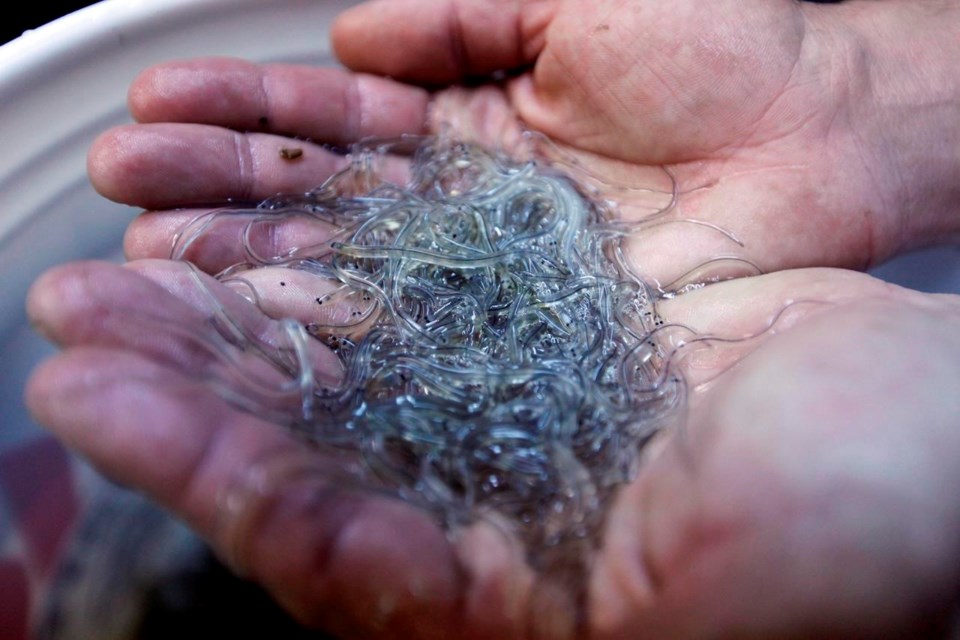HALIFAX — Tiny, translucent baby eels, called elvers, are back in the news after two Mi’kmaq men from Nova Scotia reported being detained by federal fisheries officers and then left far from home at 1 a.m. -- without footwear or phones -- after they were caught fishing near Shelburne, N.S.
The federal government closed the lucrative elver fishery on March 11 after violence and intimidation plagued last year's fishing season in Nova Scotia and New Brunswick. But many Mi’kmaq people maintain they have a treaty right to fish for the baby eels.
Prime Minister Justin Trudeau, who called the allegations of mistreatment of the fishers "very troubling,” has promised a complete investigation by his government.
In an emailed statement Thursday, Fisheries Minister Diane Lebouthillier said she intends to meet with Mi'kmaq leaders as soon as possible to discuss the arrests of the two fishers. The minister was not made available for an interview.
Why are elvers so valuable?
The minuscule baby eels weigh a few grams and are less than 10 centimetres long. Elvers, sometimes called glass eels, are typically flown to Asia where they’re raised to maturity and sold for food. Elvers are vital to the worldwide supply of Japanese food, where the mature eels are used in unagi dishes at sushi restaurants.
The baby eels are worth about $5,000 per kilogram — more than lobsters, scallops or salmon — making them the most valuable fish by weight in Canada.
How and where are they fished?
Elvers are fished at night from coastal rivers in Nova Scotia, New Brunswick and Maine. They are harvested in the springtime as they return to the rivers from their ocean spawning areas. They can be harvested using minimal equipment, often with a bucket and a fine funnel-shaped net called a fyke net or a dip net.
“Basically you only need a bucket and a net, and you’re in business,” Stanley King, a commercial licence-holder from Nova Scotia, said about his concerns with elver poaching in a December 2023 interview.
Some commercial fishers allege that black market buyers encourage poaching.
What has the federal government done to control the fishery?
As of 2023, Ottawa had issued a total of nine licences for elver-fishing operations in Nova Scotia and New Brunswick, with an overall quota of 9,960 kilograms per season. That quota has been in place since 2005.
For the past two seasons, Ottawa has allocated 14 per cent of the commercial elver quota to Indigenous fishers. New Brunswick’s Wolastoqey Nation, which represents six bands, holds one commercial licence, while another is held by several Mi’kmaq First Nations in Nova Scotia.
Ottawa shut down the season in 2023 after reports of violence related to unauthorized fishing, and this year it did not allow the season to open. The fishery was closed in 2020 over similar concerns.
Brian Giroux, a commercial fisher with Shelburne Elver Group, said that during previous closures the federal Fisheries Department has failed to adequately guard against poaching. As a result, Giroux said Thursday that 2023 was the busiest year for illegal elver fishing he has seen in his 25-year career.
What are the First Nations claims of treaty rights?
Ottawa has said it allocated part of the elver quota to Indigenous groups to recognize their right to make a moderate living from hunting, gathering and fishing — a right affirmed by the Supreme Court of Canada in the 1999 Marshall Decision.
On March 15, the Assembly of Nova Scotia Mi’kmaw Chiefs expressed their frustration that the federal fisheries minister closed the 2024 elver season despite the assembly’s proposal for a system that it said would strengthen conservation and sustainability of the elver stocks and be “a blueprint for livelihood access.”
The assembly says Ottawa has a duty to uphold treaty rights and that the closure of this year’s season will result in the loss of more than $18 million for authorized Mi’kmaq elver fishers.
“The Assembly continues to be firm that (the Fisheries Department) must respect its reconciliation obligations by working honestly and transparently alongside the Mi’kmaq to ensure the proper management and sustainability of our resources and respect for Mi’kmaq rights," the statement says.
Commercial fishers’ concerns
Stanley King, a licence holder with Atlantic Elver Fishery, said the tension within the industry is a result of years of federal mismanagement, which has allowed poaching to flourish.
"Prior to this season, I would say they have done an abysmal job enforcing and prosecuting," King said in an interview Thursday.
King said he sees signs that early-season poaching enforcement is picking up among federal fisheries officers, adding that he hopes it continues in order to maintain the future stock of the species.
In a March 25 statement on Facebook, the Fisheries Department said that since March 6 it had arrested 39 individuals who are under investigation for the unauthorized harvest of elvers across southwest Nova Scotia.
King says the Mi'kmaq treaty right to make a moderate livelihood doesn't apply to out-of-season fishing when the sustainability of the species is at risk.
"The duty to protect conservation of any species trumps any perceived right that First Nations individual may have. So they can say that they were fishing under a moderate livelihood right, but it doesn't really fly even under the test of Marshall," he said.
This report by The Canadian Press was first published April 4, 2024.
— With files from The Associated Press.
Lyndsay Armstrong, The Canadian Press



